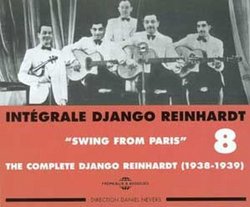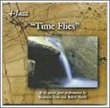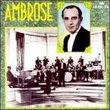| All Artists: Django Reinhardt Title: Intégrale Django Reinhardt, Vol. 8: "Swing From Paris" 1938-1939 Members Wishing: 1 Total Copies: 0 Label: Fremeaux & Assoc. Fr Release Date: 7/30/2002 Album Type: Box set Genres: International Music, Jazz, Pop Styles: Europe, Eastern Europe, Swing Jazz, European Jazz Number of Discs: 2 SwapaCD Credits: 2 Other Editions: Swing From Paris UPC: 3448960230827 |
Search - Django Reinhardt :: Intégrale Django Reinhardt, Vol. 8: "Swing From Paris" 1938-1939
 | Django Reinhardt Intégrale Django Reinhardt, Vol. 8: "Swing From Paris" 1938-1939 Genres: International Music, Jazz, Pop
Although Django Reinhardt was famous for his mood swings and volatile temper, his unique guitar work remains beyond reproach and nearly impossible to copy. A fire cost him the use of two of his fingers on his left hand, bu... more » |
Larger Image |
CD DetailsSynopsis
Amazon.com Although Django Reinhardt was famous for his mood swings and volatile temper, his unique guitar work remains beyond reproach and nearly impossible to copy. A fire cost him the use of two of his fingers on his left hand, but he turned this apparent handicap into an asset. Partner Stephane Grappelli was no doubt frustrated by Reinhardt's fiery demeanor and his nearly confrontational rhythmic support, but Grappelli translated this frustration into musical magic--the unlikeliness of the pairing was central to its amazing success. On these late-1930s classics, Grappelli swings brightly and gracefully on violin while Reinhardt plays aggressively and often frenetically. Reinhardt's conspicuous rhythm work is equally as impressive as his solos, often dominating the other three musicians and controlling the pace himself. "China Boy," recorded six months before the famous Benny Goodman Trio recording, features the guitarist's dramatic comping. Indeed, his passionate strumming threatens to swallow Grappelli's solos at times, but the violinist always seems to respond with inspired licks. The two often play a game of one-upmanship, as the intensity builds to a blistering crescendo, Grappelli's violin soaring over Reinhardt's jagged rhythm. That's not to say that Grappelli wasn't capable of forceful and energetic lines, or that Reinhardt was unable to show sensitivity. Reinhardt's pithy ideas reveal a vibrant sense of humor while his ballad style often uses sarcasm as a tool; Grappelli, in yet another contrast, usually treated these melodies with more respect. --Marc Greilsamer Similar CDs
|
CD ReviewsDecca recordings in France Richard Mrozinski | Staten Island, New York United States | 12/18/2001 (5 out of 5 stars) "This collection consists of many of the Decca recordings done in France in 1935 thru 1938. For some reason, the Decca recordings in general are not being reissued. Most of the pre-war recordings on the 100 or so CDs available are from the French Gramaphone recordings. The music on this CD is of the same quality as we are all used to and belong in the collection of anyone who enjoys the quintet at its best. The only problem with this CD is the poor restoration of the records used. You will have to re-equalize the high frequencies to restore the brilliance to the sound and accept some surface noise."
|

 Track Listings (20) - Disc #1
Track Listings (20) - Disc #1

